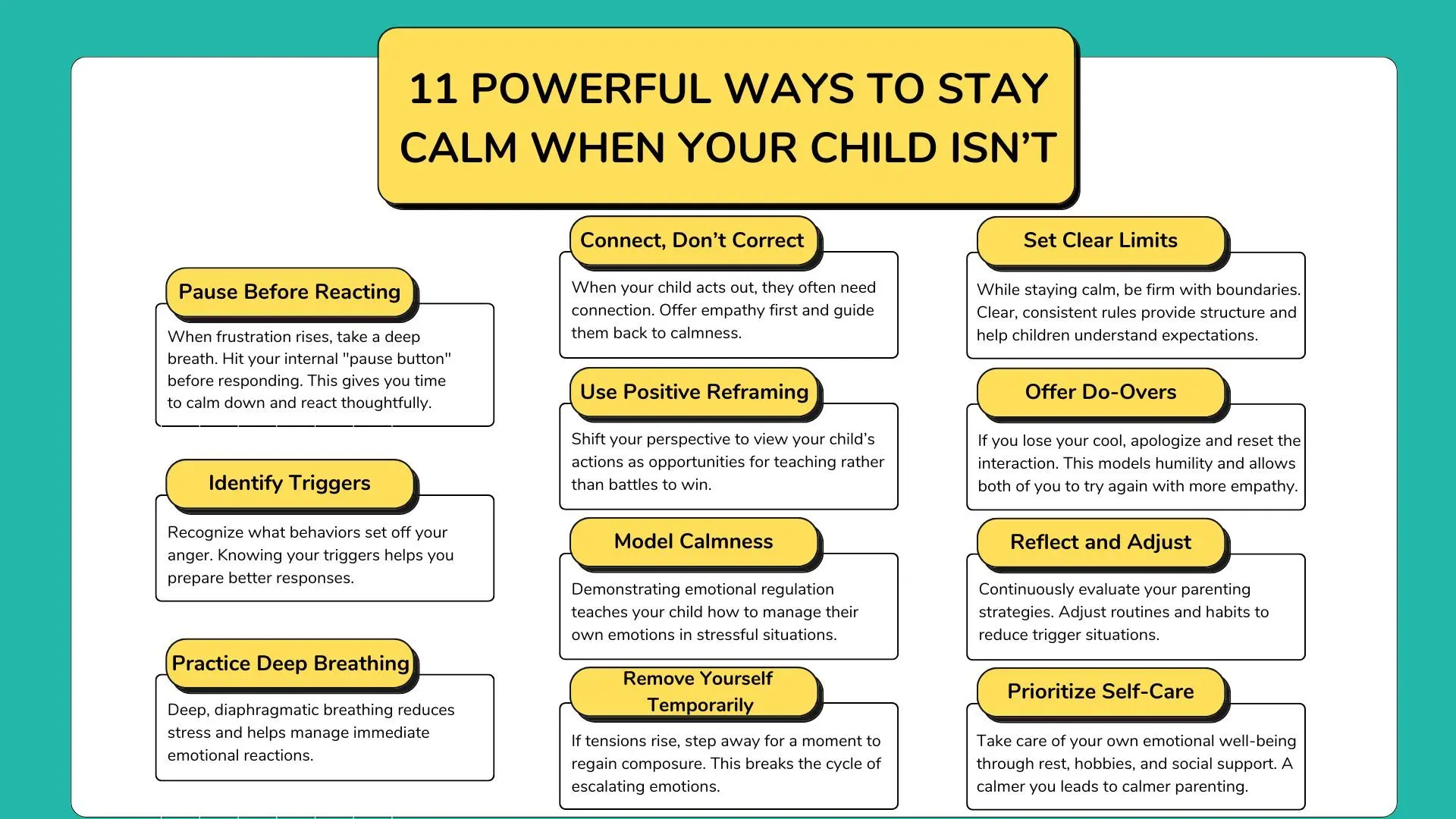Struggling with intense emotions? Check out our guide on “Anger Management for Explosive Parents” with 11 tips for staying calm and improving parenting skills.

Parenting is hard. And if you’re an explosive parent, staying calm when your child acts out feels almost impossible. I get it. We all want to raise kind, emotionally intelligent kids, but our own frustrations sometimes get in the way.
This blog post is all about guiding you — a loving parent — through moments of stress and teaching you the art of anger management for explosive parents. It’s not about perfection; it’s about progress. By the end of this post, you’ll have practical strategies to maintain calm during your child’s most difficult moments.
11 Ways to Practice Anger Management for Explosive Parents

1. Recognize the Early Signs of Frustration
Let’s start with the basics: recognizing the early signs of your own frustration. Many of us explode because we don’t catch ourselves early enough. Before you can address your child’s meltdown, you need to notice your own. Are you clenching your teeth? Is your heart rate picking up?
Do you feel a wave of heat coming over you? These are all signs that your anger is building — this is when anger management for explosive parents becomes essential.
Think of anger like gathering kindling for a fire. The more wood you gather, the hotter the fire burns. Recognizing these early signs allows you to stop the fire before it becomes a blaze.
- Tip: When you start to feel your anger rising, take a moment to pause. This might seem overly simple, but in that pause, you have the power to shift the entire direction of the situation.
2. Use Grounding Techniques to Stay Calm
Grounding techniques are your best friend when your emotions feel out of control. They help you bring your mind back to the present and allow you to regain control over your body and emotions. These techniques are at the heart of effective anger management for explosive parents.
- Deep Breathing
One of the simplest and most effective grounding techniques is deep breathing. It reduces your stress response by slowing your heart rate and lowering your blood pressure.
Close your eyes and take five to ten slow, deep breaths. You’ll be amazed at the difference this small act can make for anger management for explosive parents.
- Pause and Reset
Have you ever found yourself mid-sentence in an argument with your child, knowing it’s not going to end well, but not knowing how to stop? Here’s your permission to hit the pause button. Stop talking, take a deep breath, and reset the interaction. This is a vital component of anger management for explosive parents.
- Take a Break
If it’s getting too much, there’s nothing wrong with stepping away. Excuse yourself, take a walk, splash some water on your face, and return when you feel more composed.
Even a few minutes away from the heat of the moment can be incredibly effective for anger management for explosive parents.
3. Stay Mindful of Your Triggers
Every parent has triggers — those little things that push your buttons and seem to unleash an avalanche of frustration. Maybe it’s the constant whining, or perhaps it’s the loud yelling, disrespect, or messes that seem to follow your child around. The first step toward effective anger management for explosive parents is identifying these triggers.

- Identify Your Triggers
Sit down and reflect on what behaviors trigger you. Is it when your child yells? When they ignore you? Once you know what sets you off, you can start working on a strategy to handle those specific situations calmly with anger management for explosive parents.
- Respond, Don’t React
Instead of immediately reacting to your child’s behavior, try to respond with intention. This shift helps you move from reacting with anger to responding with compassion and logic. This mindset shift is central to anger management for explosive parents.
For instance, when my son throws his toys in frustration, my first instinct is to yell. But when I take a deep breath, remind myself that he’s expressing emotions, and calmly ask him why he’s upset, the outcome is far better — for both of us.
4. Approach the Situation with Curiosity
One of the biggest shifts in parenting comes when you start asking yourself, “Why is my child acting this way?” instead of immediately reacting with frustration. The key here is curiosity over blame, and it’s a significant component of anger management for explosive parents.
- Get Curious About the Cause
Ask yourself why your child is acting out. Are they hungry? Tired? Overstimulated? Have they not had enough one-on-one time with you today?
Getting curious allows you to address the root cause of their behavior rather than just the symptoms — a vital skill in anger management for explosive parents.
For example, if your child has a meltdown after being told they can’t have screen time, instead of immediately saying, “Because I said so,” try asking, “What’s making you upset?” You might find that they’re simply seeking your attention, or they’re tired and not handling their emotions well.
5. Validate Your Child’s Emotions
Children often act out because they don’t yet know how to express what they’re feeling. By validating their emotions, you help them feel seen and understood, which can prevent further escalation. This emotional connection can significantly enhance your journey toward anger management for explosive parents.
- Empathize with Their Feelings
For example, if your child is angry because their sibling took their toy, say something like, “I understand you’re upset that your brother took your toy. “It’s perfectly normal to feel upset about that.”
- Reframe Your Thoughts
When you recognize that your child is acting out because they’re overwhelmed with emotions, it can shift your perspective.
Instead of seeing their behavior as a personal attack, you’ll realize they need your guidance to navigate their feelings. This mindset reframe is central to anger management for explosive parents.
6. Practice Active Listening
In the heat of the moment, many parents (myself included) fall into the trap of not truly listening to their children. We’re too busy formulating our response or simply waiting for them to finish talking so we can jump in with a solution. But active listening can be a game-changer for anger management for explosive parents.

- Listen Without Interrupting
“When your child is distressed, make sure to give them your complete attention”. Listen to what they have to say without interrupting or immediately trying to fix the problem. This is a key component of successful anger management for explosive parents.
- Ask Open-Ended Questions
Encourage your child to express their feelings. Ask straightforward questions such as, “Could you explain what’s bothering you?” or “How are you feeling right now?” show that you truly care about their feelings.
- Be Mindful of Your Tone
Lowering your voice and getting down on their level physically can make your child feel safe and understood, which in turn can help defuse the situation and support your anger management for explosive parents’ journey.
7. Build Emotional Regulation Skills in Children
Teaching emotional regulation isn’t just something we do for ourselves. We also need to model and teach our children how to calm themselves down when they’re upset. This is essential for both your child’s development and your own anger management for explosive parents’ journey.
- Develop a Calming Toolkit
Help your child develop strategies that work for them when they’re upset. These could include taking deep breaths, counting to ten, doing some jumping jacks, or hugging a stuffed animal.
This proactive approach can significantly enhance your effectiveness with anger management for explosive parents.
- Model Emotional Control
Show your child how you calm yourself when you’re angry or stressed. Children learn by example, and when they see you handle your emotions with grace, they’ll be more likely to do the same. This is foundational to anger management for explosive parents.
8. Implement Consistent Boundaries
Empathy and validation are essential, but that doesn’t mean your child can act however they please. Consistent boundaries are crucial for teaching children what behavior is and isn’t acceptable, and they’re also a significant part of anger management for explosive parents.
- Set Clear Limits
Let your child know that certain behaviors, like hitting or yelling, are never okay, even when they’re upset. This reinforces that while their feelings are valid, there are appropriate ways to express them — an important lesson in anger management for explosive parents.
- Consistent Consequences
Consistency is key. When you enforce boundaries consistently, your child learns what’s expected and feels more secure knowing that certain behaviors will always have consequences. This is vital for effective anger management for explosive parents.
For example, if your child throws a toy in anger, calmly take the toy away and explain why that behavior isn’t allowed. Follow through with a predetermined consequence, like losing a privilege, to reinforce the lesson. This consistency will help you with your own anger management for explosive parents’ journey by reducing the frequency of behavior that triggers you.
9. Offer a “Do-Over” When Necessary
Let’s be real — none of us are perfect. Even the calmest parents lose their cool at times. When this happens, don’t beat yourself up. Instead, offer a “do-over.” Anger management for explosive parents is as much about self-compassion as it is about patience with your child.
- Apologize and Reset
If you find yourself yelling or reacting poorly, take a moment to apologize to your child. Not only does this model the kind of behavior you want to see in them, but it also resets the tone of the interaction. Saying, “I’m sorry for raising my voice.
Let’s try that again,” can be incredibly powerful for both of you and is a key component of anger management for explosive parents.
- Create a New Outcome
After you’ve apologized, approach the situation differently. Listen to your child’s concerns, validate their feelings, and work together to find a solution.
This allows both you and your child to build better habits and grow together in emotional intelligence.
10. Reflect and Adjust Parenting Strategies
Parenting is not a static process — it requires flexibility, reflection, and constant adjustment. As you practice anger management for explosive parents, you’ll begin to notice patterns in both your behavior and your child’s. Use these insights to refine your parenting strategies.

- Observe Behavioral Patterns
For example, if your child consistently has meltdowns at certain times of the day, such as before bed or after school, these could be indicators of deeper issues, like exhaustion or overstimulation.
You can play their favorite game with them, go for a walk with them or can have their suggested quality time to overcome this.
- Adapt Based on Experience
It’s important to be open to changing your approach based on what you’ve observed and learned. Parenting is all about learning from your mistakes and making adjustments.
Whether it’s adjusting bedtime routines or setting clearer expectations, adapting is key to both your success and your anger management for explosive parents’ journey.
11. Practice Self-Care
Finally, don’t forget to take care of yourself. Parenting can be draining, especially when you’re dealing with the challenges of anger management. But remember, the calmer and more centered you are, the better equipped you’ll be to handle difficult situations. Anger management for explosive parents starts with self-care.
- Make Time for Yourself
Find time in your day — even if it’s just a few minutes — to do something that relaxes and recharges you. Whether it’s reading, taking a bath, exercising, or simply sitting quietly, making time for yourself is crucial.
When you feel your best, you’re better able to manage your emotions and practice anger management for explosive parents effectively.
- Get Support
Don’t hesitate to seek out support from other parents, friends, or even professionals. Sometimes just talking through your challenges with someone who understands can make a huge difference. Remember, seeking support is a sign of strength, not weakness.
It helps to have a community that encourages you in your anger management for explosive parents’ journey.
Conclusion
Mastering anger management for explosive parents isn’t a one-time fix — it’s an ongoing process that involves self-awareness, practice, and a lot of patience. But as you implement these strategies, you’ll not only improve your ability to stay calm in the face of your child’s meltdowns but also teach your child how to manage their own emotions.
This is a lifelong gift you’re giving them, one that will help them navigate challenges well into adulthood.
It’s okay to stumble along the way. Parenting is full of ups and downs, and no one expects you to be perfect. What matters is that you’re making the effort to improve, for both yourself and your child.
You’re showing them that even when things get tough, it’s possible to stay calm and handle emotions with grace. And that lesson? It’s an experience that will stay with them for a lifetime.
Remember, you’re not alone in this journey. Parenting is tough, but with the right tools and mindset, you can become the calm, patient parent you strive to be. So, how do you handle your own explosive moments?
Share your experiences in the comments below, your story might just help another parent.
You may also be interested in : Parenting Your Inner Child: Signs, Triggers, And 10 Therapeutic Ways